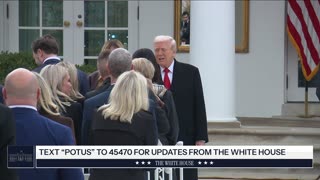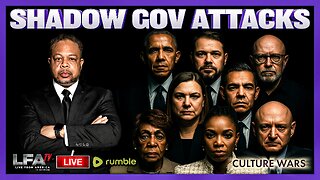Premium Only Content

Other Worlds: The Turner Diaries, Chapter 16.
Chapter Sixteen.
April 10, 1993. This is the first time in a week I've had some time
to myself and have been able to relax. I'm in a Chicago motel with
nothing to do until tomorrow morning, when I'll take a tour of the
Evanston Power Project. I flew out here Friday afternoon for two
things: the Evanston tour and a delivery of hot money to one of our
Chicago units. Bill started his press up Monday night, as soon as
we had mixed the chemical additives into the ink, and he kept it
going almost continuously until the wee hours of Friday morning,
with Carol spelling him twice for a few hours of sleep. He didn't
shut down until he had used the last of the banknote paper acquired
for the purpose. Katherine and I helped by doing the cutting and by
handling the paper at both ends of the press. The work nearly
killed all of us, but the Organization wanted the money in a hurry.
They really have a pile of it now! I had never dreamed of seeing
so much money in my life. Bill printed just over ten million dollars
in $10 and $20 bills-more than a ton of crisp, new banknotes. And
they look good! I compared one of Bill's new tens with a genuine,
new one, and I couldn't tell which was which, except by the serial
numbers.
Bill really did a professional job all around. Every bill even has a
different serial number. This project just shows what can be
accomplished with careful planning, dedication, and hard work. Of
course, Bill had six months to set things up and practice with dry
runs, before I was available to help him with the ink additives and
the UV unit. He had all the bugs worked out of the process before
beginning his three-and-a-half-day run.
I brought 50,000 of the new 20's with me and delivered them to
my Chicago contact yesterday. His unit has the job of "laundering"
the bills, so that an equivalent amount of genuine currency will be
available for the Organization's expenses in this area. That's really
a much trickier and more time-consuming operation than theprinting.
At the same time I left for here, Katherine was boarding a flight
for Boston with $800,000 in her luggage. Later this week we will
be making deliveries in Dallas and Atlanta. Getting through the
airport security checks with all that hot money is a little ticklish,
but as long as they don't do anything other than x-ray our luggage
we'll be all right. The only things they seem to be looking for now
are bombs and firearms.
But just wait until they begin picking up
our hot bills all over the country!
I had a chance to do some thinking on the plane from
Washington. From 35,000 feet one gets a different perspective on
things. Seeing all those sprawling suburbs and freeways and
factories spread out below makes one realize just how big America
is and what an awesomely difficult task we have undertaken.
Essentially, what we are doing with our program of strategic
sabotage is hastening along somewhat the natural decay of
America. We are chipping away at the termite-eaten timbers of the
economy, so that the whole structure will collapse a few years
sooner-and more catastrophically-than without our efforts. It is
depressing to realize what a relatively small influence all our
sacrifices are having on the course of events.
Consider our counterfeiting for example. We will have to print
and distribute in a year's time at least a thousand times as much
money as Bill printed last week-at least $10 billion a year- before
we will make even a barely measurable effect on the national
economy. Americans spend three times that much just on
cigarettes.
Of course, we have two other money presses running on the West
Coast, and we'll be setting up others in the near future. And if I can
figure a way to take out the Evanston Project, that'll be a capital
loss of nearly $10 billion in one stroke-not to mention the
economic damage which will result from the loss of electrical
power to industrial plants throughout the Great Lakes region.
But we are doing something else which is really more important
than our campaign against the System. In the long run, it will be
infinitely more important. We are forging the nucleus of a new
society, a whole new civilization, which will rise from the ashes of
the old. And it is because our new civilization will be based on an
entirely different world view than the present one that it can only
replace the other in a revolutionary manner. There is no way a
society based on Aryan values and an Aryan outlook can evolve
peacefully from a society which has succumbed to Jewish spiritual
corruption.
Thus, our present struggle is unavoidable, completely aside from
the fact that it was forced on us by the System and was not of our
choosing. Looking at the events of the past 31 months from this
viewpoint-that is, considering our constructive task of building a
new social nucleus rather than our purely destructive war against
the System-it appears to me that our initial strategy of hitting
System leaders instead of the general economy was not really as
bad a way to start as I had thought.
It shaped the character of the battle from the beginning as us vs.
the System, rather than us vs. the economy. The System responded
repressively to protect itself from our attacks, and this caused it to
isolate itself to a certain extent from the public. When we weren't
doing much but assassinating Congressmen, Federal judges, secret
policemen, and media masters, the people themselves did not feel
especially threatened, but they resented the inconveniences caused
by all the System's new security measures.
If we had hit the economy from the beginning, the System could
have more easily painted the struggle as one of us vs. the people,
and it would have been easier for the media to convince the public
of the necessity of collaborating with the System against a
common menace-namely us. So our initial error in strategy has
providentially made it easier for us to recruit now, when we are
deliberately working to make things as uncomfortable for everyone
as we can.
And it isn't just the Organization which has been doing a lot of
recruiting lately. The Order is also growing at a rate unprecedented
in the last 48 of its nearly 68 years of existence.
I surreptitiously made the Sign when I met our pickup man here yesterday-as I
always do when I meet new Organization members now - and I
was pleasantly surprised when he responded in kind.
He invited me to be a guest at an induction ceremony last night
for new probationary members in the Chicago area. I gladly
accepted, and I was astounded to count approximately 60 persons
at the ceremony, nearly a third of whom were inductees.
That's
more than three times the total number of members the Order has
in the Washington area. I was nearly as moved by the ceremony as
I was by my own induction a year and a half ago.
April 14. Problems, problems, problems! Nothing has gone right
since I got back from Chicago.
Bill can't find any more of the paper he used for the last batch of
money, and he asked me to help him improvise. We tried tinting
some slightly off-color paper of the same basic texture and
composition, but the result was unsatisfactory. Bill will keep
looking for another supply of the original paper, while I continue
trying different tinting processes.
Then there was the delegation from the local Human Relations
Council which visited the shop yesterday. Four Blacks and a sick,
sick, sick White male, all wearing Council armbands, came into
the print shop. They wanted to put a big poster in the shop
window- the same kind one sees everywhere now, urging citizens
to "help fight racism" by reporting suspicious persons to the
political police-and leave a container for donations on the counter.
Carol was behind the counter at the time, and she told them, in
effect, to go to hell.
That, of course, wasn't the right thing to do, under the
circumstances. They would have reported us to the political police,
if I hadn't heard the commotion and intervened. I came up the
basement stairs with what I hoped was a convincingly Jewish
expression on my face and went into a "So, vot's goink on here,already?" routine.
I laid it on thick-not too thick, I hope -so they
would get the message: the shop manager here was himself a
member of a minority group, a very special minority group, and
could hardly be suspected of harboring any hostility for the Human
Relations Councils or their commendable efforts.
The head lberal began complaining indignantly to me about
Carol's rebuff. I cut him off with an impatient wave of my hand
and directed a look of mock shock at Carol. "Of course, of course,"
I said, "leave your collection box here. It's for a good cause. But no
vindow poster-not enough room. I vouldn't even let my cousin Abe
put vun of his United Jewish Appeal posters there. Come! I show
you where."
As I officiously led the delegation toward the door, I ordered
Carol back to work in my best Simon Legree manner. "Yes, Mr.
Bloom," she said meekly.
Out on the sidewalk I overcame my revulsion while I chummily
put an arm around the shoulders of the Black spokesman and
directed his attention to a store directly across the street. "Ve don't
have so many customers here," I explained. "But my good friend
Solly Feinstein has many people going in and out. And he has a big
vindow. He vill be happy for your poster to be there. You can put it
right under where it says 'Sol's Pawn Shop,' and everybody vill see
it. And be sure to leave him a donation box- two donation boxes;
he has a big store."
They all seemed pleased by my friendly suggestion and started
across the street. But the White, a sorry-looking specimen with
pimples and an imitation Afro, hesitated, turned, and said to me:
"Maybe we ought to get that girl's name. Some of the things she
said to us sounded definitely racist."
"Don't vaste your time on her," I responded brusquely, dismissing
his suspicion with a wave. "She is just a dumb shiksa, She talks
that way to everybody. I get rid of her soon."
When I re-entered the shop Bill, who had overheard the episode
from the basement stairs, and Carol were convulsed with: laughter.
"It's not really that funny," I admonished them with an effort at
sternness.
"I had to do something right away, and if my pucker and
my phony accent hadn't fooled that crew of sub-humans we'd be in
real trouble now."
Then I lectured Carol: "We can't afford the luxury of telling these
creatures what we think of them. We have a job to do first, and
then we will settle with that bunch once and for all. So, let's
swallow our pride and play along as long as we have to. Those
who don't have our responsibilities can get themselves investigated
for racism if they want-and more power to them. "
But I could not repress a grin when I saw the poster go into place
in the pawn shop window across the street, blotting out most of
Sol's display of used cameras and binoculars. He must really have
had to bite his tongue! And now all the people who see that
particular poster will make the correct mental association between
the Council's thought-control program and the people behind it.
The last thing to go wrong was Katherine coming down with the
flu last night. She was scheduled to take a load of money to Dallas
this morning, but she was too sick to go, and it looks like she'll be
in bed for another two or three days. Which means that I'll be stuck
not only with a trip to Atlanta tomorrow, but I'll also have to make
the Dallas delivery. That'll be a whole day wasted on planes and at
airports, and I need the time badly for getting ready for the
Evanston operation.
We want to hit the new nuclear power complex at Evanston
during the next six weeks, while they're still guiding tourists
through it. After the first of June, when it will be closed to the
public permanently, knocking it out will become much more
difficult.
The Evanston Power Project is an enormous thing: four huge
nuclear reactors surrounded by the biggest turbines and generators
in the world. And the whole thing sits on concrete pilings a mile
out in Lake Michigan, which supplies the cooling water for the
reactors' heat exchangers. The Project generates 18,000 megawatts
of electrical power-almost 20 billion watts! Incredible!
The power is fed into the power grid which supplies the entire
Great Lakes region. Before the Evanston Project went into
operation two months ago, the whole Midwest was suffering from
a severe power shortage-much worse than we have here, which is
bad enough. In some areas factories were restricted to operating
only two days a week, and there were so many unexpected
blackouts in addition that the region was on the verge of a real
economic crisis.
If we can take out the new power plant, things will be even worse
than they were before. In order to keep the lights on in Chicago
and Milwaukee, the authorities will have to steal power from as far
away as Detroit and Minneapolis, where there is none to spare. All
of that part of the country will be hit hard. And it took 10 years to
design and build the Evanston Project, so they won't be able to
remedy the situation very soon.
But the government has thought about the consequences of losing
the Evanston Project too, and the security there is pretty
formidable. One can't get near the place except by boat or airplane.
And there are searchlights, patrol boats, and strings of buoys with
nets of cable between them all around it, which makes the
approach by water almost out of the question.
The shore for miles in either direction is fenced off, and there are
a number of military radar and anti-aircraft installations behind the
fence, making any attempt to crash an airplane loaded with
explosives into the plant very unlikely to succeed.
It seems to me that about the only way we could mount an attack
on the place by conventional means would be to sneak some heavy
mortars within range, somewhere near the shore where there is a
possibility for concealment. But, to my knowledge, we don't have
that kind of weaponry available at the moment. Anyway, the really
vital parts of the power station are in such massive buildings that I
doubt a mortar attack could inflict more than superficial damage.
So, Revolutionary Command asked me to tour the place and
come up with some unconventional ideas-which I have done, but
there are still several tough problems to be solved.
My visit there last Monday gave me a pretty good idea of the
strengths and weaknesses of the security arrangements. Some of
the weaknesses are really quite astounding. Most astounding of all
is the government's decision to let tourists into the place, even
temporarily. The reason for that decision, I am sure, is the big fuss
the anti-nuclear crazies have been making about the plant. The
government feels obligated to show the public all the safety
features which have been built into it.
When I signed up for the tour, I deliberately loaded myself down
with all sorts of paraphernalia, just to see what I could get into the
plant. I carried an attach_ case, a camera, and an umbrella, and I
filled my pockets with coins, keys, and mechanical pencils.
On the ferry boat which takes tourists out to the plant there is
very little security. They merely made me open my attach_ case for
a cursory inspection. But when I got into the guard station at the
plant itself, they divested me of my case, camera, and umbrella.
Then I had to walk through a metal detector, which picked up all
the metal junk in my pockets. I emptied my pockets for the guards,
but then they handed the stuff back to me. They didn't look closely
at any of it. So, one can at least sneak an incendiary pencil in.
What really interested me, though, was that one old gentleman in
my group was carrying a cane with a metal head, and the guards let
him keep it during the tour.
In essence, my idea is this: Since there's no way a single tourist
can sneak in enough explosive material to wreck the place-nor any
way he can position the small amount he could sneak in so it
would be really effective, like punching a hole in one of the reactor
pressure vessels, we may as well forget about explosives. Instead,
we'll try to contaminate the plant with radioactive material, so that
it can't be used.
What makes this idea feasible is that we have a source, inside the
Organization, for certain radioactive materials. He's a chemistry
professor at a university in Florida, and he uses the materials in his
research.
We can easily pack enough of a really hot and nasty radionuclide-something
with a half-life of a year or so-into a cane or a crutch,
together with a small explosive charge for dispersing it, to make
the entire Evanston Power Project uninhabitable. The plant won't
be damaged physically, but they'll have to shut it down.
Decontamination will be such an enormous task that the plant may
very well stay closed permanently.
Unfortunately, this will be a suicide mission. Whoever carries the
radioactive material into the plant will already have been exposed
to a lethal dose of radiation before he gets to the plant gate with it.
There's just no practical way to provide for any shielding.
The biggest worry is the radiation detectors which are all over the
plant. If one of those gets a whiff of our man before he's ready to
do his thing, it could get sticky.
I noticed, however, no detectors in the entrance station of the
plant, where the guards check the incoming tourists. There are
several in the huge turbine-and-generator room, where the tourists
are taken, and there is one beside the exit gate used by the tourists-
presumably to guard against the unlikely event of a visitor
somehow pocketing a piece of nuclear fuel and trying to sneak it
out. But it seems not to have occurred to them that someone might
try to sneak radioactive material into the plant.
I remember pretty well where all the detectors are, and I'll have to
consult with our man in Florida on the likelihood of one of them
picking up something at a given distance from the material he will
supply us. If an alarm goes off after our carrier is in the plant but
before he gets to the generator room, he'll just have to make a run
for it. But we'll try to design our gadget so as to give him the best
possible chance.
The whole plan is pretty scary, but it has one big advantage: the
psychological impact on the public. People are almost superstitious
in their fear of nuclear radiation. The anti-nuclear lobby will have a
field day with it. It will catch people's imagination to a far greater
extent than any ordinary bombing or mortar attack. It will horrify
many people-and it will knock more of them off the fence.
I must confess that I'm glad at this point that my probationary
period still has 11 months to run and that I won't be asked to
volunteer for this particular mission.
-
 14:54:37
14:54:37
PukeOnABook
2 months agoGERMANY'S AIMS IN THE FIRST WORLD WAR. Fritz Fischer. Part 1
66 -

Sean Unpaved
3 hours agoIs Lane Kiffin Staying At Ole Miss Or LEAVING For LSU? | UNPAVED
9.79K -
 29:48
29:48
The White House
3 hours agoPresident Trump and The First Lady Participate in the Thanksgiving Turkey Pardoning
24.3K15 -
 1:58:04
1:58:04
The Charlie Kirk Show
2 hours agoMark Kelly Court Martial + AI Embargo + Thanksgiving | Davis, Federer, Newcombe | 11.25.2025
56.5K15 -
 53:20
53:20
The Rubin Report
3 hours agoLara Trump Destroys Bill Maher’s Narrative w/ Facts in 1 Minute
40.9K41 -
 56:32
56:32
TheAlecLaceShow
2 hours agoGuest: Rep. Tim Burchett | Ukraine Russia Peace Deal | Trump SLAMS Seditious 6 | The Alec Lace Show
12.8K -
 LIVE
LIVE
LFA TV
16 hours agoLIVE & BREAKING NEWS! | TUESDAY 11/25/25
2,135 watching -
 1:08:44
1:08:44
VINCE
6 hours agoThe Deep State Strikes Back! (Guest Host Shawn Farash) | Episode 176 - 11/25/25 VINCE
205K142 -
 2:14:00
2:14:00
Benny Johnson
4 hours agoIt's All True, The 2024 Election Was Ready To Be Rigged. The REAL Story of How Trump-Elon STOPPED It
75.5K91 -
 1:46:09
1:46:09
The Mel K Show
3 hours agoMORNINGS WITH MEL K - A Republic.. If You Can Keep It! 11-25-25
24K6